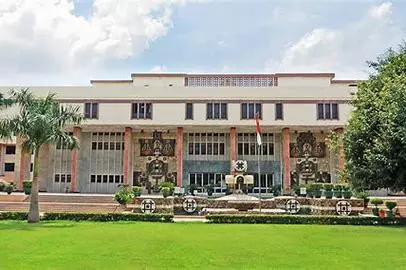Directors Cannot Be Held Liable For Dishonour Of Cheques After Commencement Of CIRP Proceedings: Delhi High Court
Tazeen Ahmed
13 Jan 2025 11:50 AM IST
The Delhi High Court bench of Justice Amit Mahajan has reiterated that proceedings under Section 138 of the Negotiable Instruments Act, 1881 for dishnonour of cheque cannot continue against individuals once a moratorium under Section 14 of the Insolvency and Bankruptcy Code, 2016 (IBC) is in effect. Brief Facts The petitions seek to quash the summoning order dated 01.04.2022...
The Delhi High Court bench of Justice Amit Mahajan has reiterated that proceedings under Section 138 of the Negotiable Instruments Act, 1881 for dishnonour of cheque cannot continue against individuals once a moratorium under Section 14 of the Insolvency and Bankruptcy Code, 2016 (IBC) is in effect.
Brief Facts
The petitions seek to quash the summoning order dated 01.04.2022 issued by the Metropolitan Magistrate, Rouse Avenue Court, Delhi, in CC No. 9170/2020, filed under Section 138 of the Negotiable Instruments Act, 1881 (NI Act), and all related proceedings.
Petitioner No. 1 (suspended director) and Petitioner No. 2 (authorized signatory) issued six cheques on behalf of their company in compliance of the order 24.07.2019 passed by the NCDRC in Execution Application 93/2017. Two cheques dated 23.07.2019, amounting to ₹5 lakh each were duly honoured.
The company was admitted into Corporate Insolvency Resolution Process (CIRP) under Section 7 of the IBC and a moratorium under Section 14 was imposed on 31.10.2019.
Two cheques for ₹10 lakh each were presented for encashment but were dishonored for the reason “Drawer Signature to operate account not received.” The respondent filed a complaint under Section 138 of the NI Act.
Issue
Whether proceedings under Section 138 of the NI Act can continue against individuals after the commencement of the CIRP proceedings against the accused company?
Submissions
Mr. P.S. Bindra, Adv., Counsel for Petitioners submitted that in view of the moratorium, the cheques were incapable of encashment and hence, the petitioners cannot be held liable for offence under Section 138 of the NI Act. He contended that, under Section 17 of the IBC, the management of the corporate debtor's affairs vests in the IRP as of the date of appointment, and the petitioners no longer have any role in the company's affairs. He submitted that the offence under Section 138 of the NI Act was committed on the date when the petitioners were not "in charge of" or "responsible for the conduct of the company's business”.
Observations
The court noted that the control and management of the corporate debtor are vested in the Interim Resolution Professional (IRP). The cheques in question were dated 15.01.2020 and 15.03.2020, respectively. However, the IRP was appointed on 31.10.2019, prior to these dates. Consequently, the account was blocked due to the order issued by the NCLT, and this cannot be attributed to the account holder. As a result of the NCLT's order, the authority and control of the account holder over the account ceased to exist.
The court relied upon Govind Prasad Todi & Anr. V. Govt. of NCT of Delhi & Anr., where the court quashed the summoning order in similar circumstances, observing that once a moratorium under section 14 of the IBC is in effect, proceedings under Section 138 of the NI Act against the corporate debtor cannot continue.
The court observed that the ingredients for constituting the offence punishable under Section 138 of the NI Act occurred post imposition of moratorium. The petitioners therefore cannot be held vicariously responsible for dishonour of cheque. The court allowed the petition.
Case Title: Ganesh Chandra Bamrana and Ors. vs. Rukmani Gupta
Case Number: CRL. M.C. 6170/2022 & CRL. M.A. 24285/2022, CRL.M.C. 6178/2022 & CRL.M.A. 24297/2022
Date of Judgment: 17.12.2024



